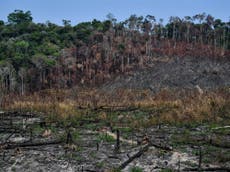Rishi Sunak has pulled his punches over the climate crisis in the Budget
The chancellor’s response to one of the biggest issues the world faces is too piecemeal and, in some areas, counterproductive
Rishi Sunak was right to focus the budget on protecting both the economy and public health in the face of the threat from the coronavirus outbreak - known as Covid-19. As Sunak argued in his budget speech, the impact of coronavirus will be significant but temporary, and in response he outlined a comprehensive but short-term response. For that, despite some shortcomings, he deserves praise.
But the task of a chancellor is not only to protect us against short-term economic crises but long-term ones too. In the pre-Budget build-up, we certainly got the sense that the environmental crisis was in Sunak’s sights, with the first Budget both of this government and this chancellor also being billed as the "first for climate and nature".
First, the good news. Sunak used perhaps the longest environmental section of any chancellor’s speech in history to announce a whole range of green measures. An increase in levies on gas, red diesel and plastic packaging, money for electric vehicle charging infrastructure and investment in a "nature for climate" fund are all positive steps forward. “We promised to deliver green growth and protect our environment,” he intoned. “This Budget gets it done.”
But in truth, where the chancellor appeared to pull out all the stops to tackle the public health crises, he pulled his punches on the climate crisis. IPPR analysis suggests that the government needs to invest an additional £33 billion a year to meet its 2050 net zero target and restore nature, but the investment Sunak announced for green infrastructure fell well short of that.
Overall, he promised significant investment over the next five years “for our future prosperity”. Yet his single biggest infrastructure commitment was to invest £27 billion in a major roads programme, locking in the high carbon infrastructure of the future. Perhaps to ensure those roads remain busy, the chancellor also confirmed that fuel duty would be frozen for the tenth year in a row - which some estimate will mean half a million more cars on the road over this parliament than if the tax had been uprated with inflation.
Achieving net zero is a mammoth task. We will need to change how we heat our homes and get to work, and what we buy. It needs significant public investment in infrastructure that is climate safe, but the benefits will be considerable. From warmer homes and better public transport to creating high quality, high-skilled jobs, decarbonisation offers us the opportunity to build a more prosperous, just and sustainable economy.
The chancellor’s speech seemed to acknowledge this. But his rhetoric was not matched by the serious plan and strategy needed to set the UK on the path to net zero. Without it, the UK will struggle to show the global leadership needed as host of the COP 26 climate summit in Glasgow this autumn - perhaps the most important such event in a generation.
In the face of a hugely significant crisis that will have lasting negative economic and social impacts, and demands a transformational shift in our economy, the chancellor’s response was too piecemeal and, in some areas, counterproductive. In other words, it was a sharp contrast to the government’s approach to Covid-19.
We must hope that what was announced today was just a down payment on a much bigger package to be announced at the spending review later this year. Getting ‘the environment done’ will require nothing less.
Luke Murphy is the head of the Institute for Public Policy Research (IPPR) Environmental Justice Commission






Join our commenting forum
Join thought-provoking conversations, follow other Independent readers and see their replies